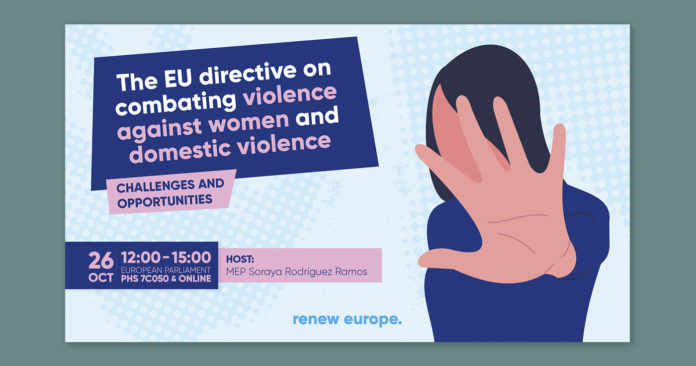Brussels, European Parliament
During the European Gender Equality Week of the European Parliament, Soraya Rodriguez organised an event about the European Directive on combating gender-based violence together with Renew Europe. Several national and European experts intervened during the event, including Teresa Peramato, public prosecutor for gender-based violence, and Marisa Soleto, the director of the Women’s Foundation. The conference had the aim to review the most positive aspects and challenges of the Directive launched by the Commission, on which the European Parliament is now working.
50 women are killed as victims of gender-based violence every week in the EU. 1 in 20 has been raped. For this reason, Soraya Rodriguez, spokesperson for Women’s Rights and Gender Equality at Renew Europe, Soraya Rodriguez, has stressed the need to achieve the approval of this Directive in order to finally have common tools to fight against gender violence at the European Union level, and has called for a determined fight against the extreme right and other negationist discourses in Spain and the EU. We cannot take a step backwards while denialism grows worldwide: we have to fight it.
The creation of this Directive has also been motivated by the need to overcome the standstill of the ratification of the Istanbul Convention by the European Union, due to the refusal of some Member States to do so. With this proposal, the European Commission is putting on the table the possibility of finally having our own EU-wide instrument to combat gender-based violence, and to harmonise the European legislative situation so that women’s protection and their access to justice does not depend on the Member State in which they are born.
However, during the event, Soraya Rodríguez explained that, despite the fact that the Directive represents a big step forward, it only applies to some specific forms of gender violence due to the weakness of its legal basis. The forms of violence that the directive considers are, on the one hand, rape, with the classification of this crime taking into account the lack of consent, since in some Member States the use of force or threats is necessary; and also, female genital mutilation and certain forms of cyberviolence. Soraya Rodríguez also pointed out that the appropriate legal basis would have been the extended article 83, which considers gender violence as a eurocrime.
The Directive and the protection of Minors
Teresa Peramato, public prosecutor for gender-based violence, also spoke at the conference. Peramato claimed that the directive is also an excellent tool for Spain, which has one of the most advanced regulations as regards violence against women. That said, she proposed some improvements. “The Directive lacks a specific consideration of children who live in environments of gender-based violence as victims. “Concrete measures are needed in that respect” she expressed.
51.7 per cent of victims of gender-based violence with children claim that the kids were also abused, often using extreme violence to harm their mother. “We must take very courageous measures to protect children. We must be at the forefront and the Directive should take measures to ensure that custody is never granted to an abuser, that visits are restricted and that parental authority is suspended when a parent has killed the mother and is convicted, as well as preserving the assets of the aggressors to enforce the right to compensation for children,” she explained.
Marisa Soleto, president of the Women’s Foundation, also spoke. “Many Spanish feminist organisations are advocates of this directive. We need even better legislation,” she said. She also stressed that we must protect minors and implement stronger regulations on parental responsibility.
Soleto also pointed out that violence against mothers directly affects children, making them the object of blackmail, sometimes even putting their lives at stake. “The lack of protection for minors is one of the causes of the chronification of the situation”, she added. “It is essential that the Directive makes clear the need for this protection of minors and also to repair the damage to children.
The event was also attended by Laetitia Dhervilly, Senior Officer for Gender Equality at the French Ministry of Justice; Claudia Pina, Coordinator of the Support Team of the European Judicial Network on Cybercrime (EUROJUST); Irene Zeilinger, member of the Board of Directors of Women Against Violence Europe (WAVE): Réka Sáfrány, President of the European Women’s Lobby; Kalliopi Mingeirou, Head of Section on Ending Violence against Women and Girls at UN Women; Carlien Scheele, Director of the European Institute for Gender Equality (EIGE); Lesta Radelicki, Gender Equality Contact Point in the Cabinet of Helena Dalli, European Commissioner for Equality.
All of them are Women at the Forefront who, from their positions, actively participate in the fight for gender equality and share the same commitment to eradicate the systematic violence that millions of women suffer daily.


